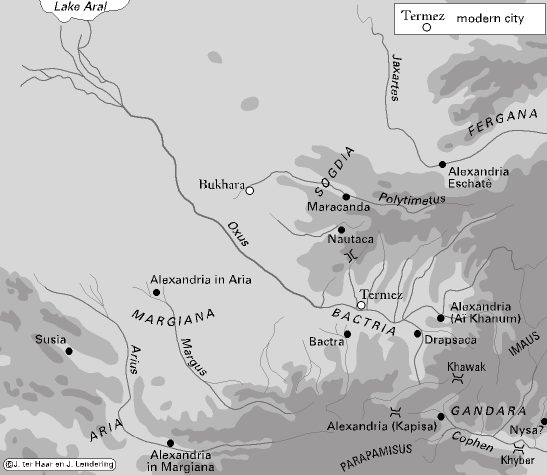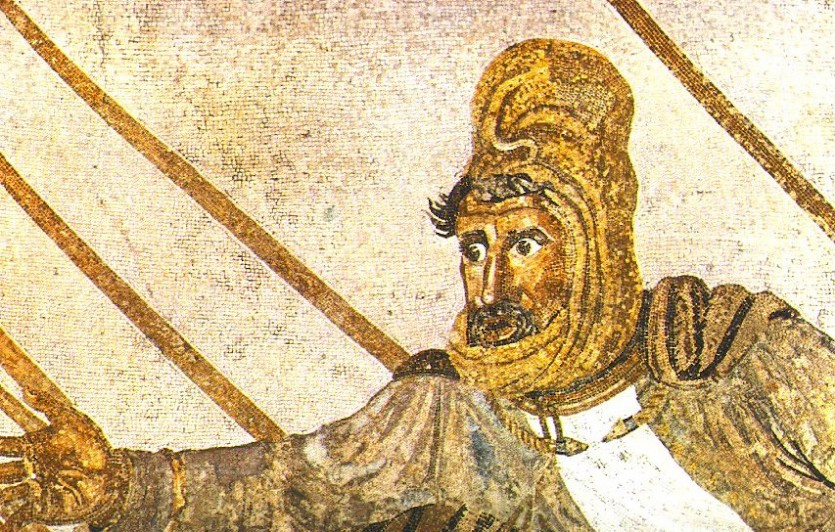Artaxerxes V Bessus
Bessus: Persian nobleman, murderer and successor of king Darius III Codomannus. He reigned as Artaxerxes V between July 330 and late Summer 329 BCE.

In the summer of 331, Bessus commanded as satrap the Bactrian troops. This means that he was a very important Persian nobleman and probably a close relative of king Darius III Codomannus (336-330), because the satrap of Bactria -northern Afghanistan- usually was the first in the line of succession, the mathišta. (A crown prince would reign Bactria for a couple of years and a king without grown-up sons would appoint his brother in this satrapy.) The precise relation between Darius and Bessus remains unclear.
On 1 October 331, the Macedonian king Alexander the Great (336-323) defeated the Persian army at Gaugamela. During the winter, Darius, who stayed at Ecbatana, tried to build a new army and ordered his satraps to bring reinforcements. They never arrived; it is not clear why.
Darius was now forced to go to the eastern satrapies, which were famous for their mounted archers. If he could reach Bactria, he would be save. However, Bessus, Barsaentes (the satrap of Arachosia and Drangiana), and Satibarzanes (the satrap of Aria), assessed the situation differently. If they remained loyal to their king, the Macedonians would invade the eastern satrapies. On the other hand, if they arrested Darius and delivered him to the invaders, there would be no war, because it was unlikely that the Macedonians were interested in faraway countries, where they would be forced to fight a war of an unknown type.

As a consequence, they arrested Darius when he was in Parthia; probably, they wanted to deliver him to Alexander. To the Macedonian king, this was unacceptable: if he executed his prisoner, his Persian subjects would never be loyal to Alexander's reign, but if he left him alive, there would be a natural focus for Persian resistance. To prevent the bargain, Alexander and his cavalry rushed to the east, striking terror among Bessus and his followers. In early July 330, Darius was executed; his murderers fled to Bactria. The incident is mentioned in the contemporary Alexander Chronicle.
Bessus' policy does not look very kind, but it was not unreasonable. Arresting and extraditing Darius could have been instrumental to save the eastern satrapies - except for the fact that Alexander had decided to stay in Asia. Other invaders had ultimately left the Achaemenid empire, but this was not Alexander's idea.
If Bessus had surrendered at this stage of the war, he would have become one of Alexander's most respected courtiers (the other murderers, Satibarzanes and Barsaentes, were initially pardoned). However, after a few weeks, according to Arrian of Nicomedia, Bessus proclaimed himself king and took the name Artaxerxes V. This was a mistake, because Alexander considered himself the rightful Persian king; he now had to attack Bessus. In fact, Bessus gave Alexander an excuse to continue his march to the east.
Bessus tried to defend Bactria and Sogdia, and in fact forced Alexander to make a detour through Drangiana, Arachosia and Gandara, that is through southern Afghanistan. In the Spring of 329, Alexander crossed the Hindu Kush mountains, which Bessus had left unguarded because only a madman would try to cross them early in the year. His mistake was decisive.
Bessus tried to prevent the Macedonian crossing of the Oxus river by burning all available ships. However, Alexander's men built rafts: they stuffed their tents with hay, and five days later, the army was on the other bank in the southeast of what is now called Turkmenistan. The crossing of the Hindu Kush, the pebble desert and the Oxus were impressive deeds and the enemy lost heart. Bessus' courtiers Spitamenes and Datames arrested Artaxerxes V Bessus and handed him over to Ptolemy, Alexander's friend and future biographer.
Alexander had Bessus cruelly mutilated: his ears and nose were cut off. This was shocking to the Greeks and Macedonians, but it was what Alexander had to do as a Persian king who punished a regicide. Two centuries before, Darius the Great had ordered the same treatment for Phraortes, the last ruler of independent Media.note After the mutilation, Alexander handed Bessus over to Darius' brother Oxyathres, ordering that he should bring the rebel to the place where he had killed his master, crucify him and keep the vultures away from the dead body. This was a very gruesome deed: the Zoroastrians believed that the dead must be devoured by birds. It was the Persian equivalent of the Greek denial of burial.